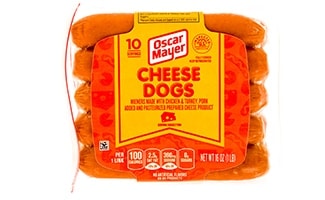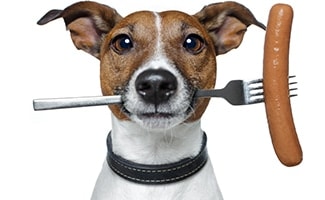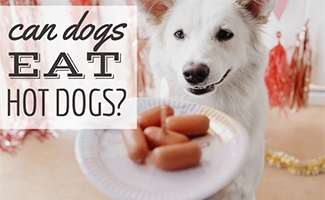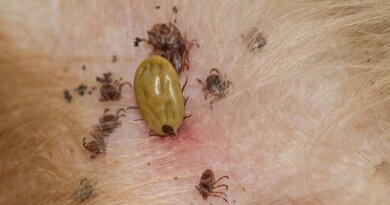Can Dogs Eat Hot Dogs As A Meal Or A Treat? – CanineJournal.com

Article Overview
Are Hot Dogs Safe For Dogs?

However, some dogs have underlying food allergies or intolerances, and their digestive systems cannot tolerate these ingredients. If your dog is known to have certain food allergies, then hot dogs are best avoided as they often have multiple ingredients, so it’s difficult to judge if they’re going to cause a problem for your furry friend.
Check The Ingredients

Processed hot dogs may be labeled based on the primary meat source they include, for example, pork. However, you should carefully check the ingredients list as they often contain mixed protein sources and other meat sources or ingredients.
Vegetarian or plant-based hot dogs and sausages are generally safe. They’re made of a cellulose plant protein and may be lower in fat. Again, they’re best to avoid if your dog has known food allergies or sensitive digestion.
Hot dogs rarely contain ingredients that are toxic to dogs. However, always check the ingredients list with processed meats. Avoid hot dogs containing onions or garlic as a main ingredient as these can cause toxicity in dogs when fed in moderate or large volumes. Also, be sure to check for onion or garlic powder or other derivatives.
Can Dogs Eat Raw Hot Dogs?
You should never feed raw hot dogs to your pup, even if he’s on a raw meat diet. Hot dogs often contain multiple, processed meat sources and contain high levels of bacteria. Uncooked hot dogs could upset your dog’s stomach or cause a more severe illness. If you’re going to treat your dog, ensure you cook the hot dog thoroughly and allow it to cool before offering it to your pooch.
Because of their high-fat content, hot dogs get very hot when cooked. Although most dogs would happily steal a snack directly from the grill if they were allowed, this can cause burns to the mouth or stomach, so they should only be fed once cooled. As a guide, you should be able to hold your finger on the meat once the hot dog is cut in half without it causing discomfort before feeding it to your dog.
What Are The Best Hot Dogs To Feed My Dog?

Choose hot dogs that have a lower fat content and are lower in calories to avoid unwanted weight gain. Cut the hot dog up into small pieces to offer your dog as a treat or reward.
Why not introduce some training games at the same time and make your dog work for his treat? Most dogs love to learn a new trick or to practice their skills!
Whole Hot Dogs Are A Choking Hazard
Regardless of the kind of hot dog you’re giving your pup, be sure to cut it up into small, bite-sized pieces. Many dogs will wolf down a hot dog, often without chewing it much. Because of their size and shape, hot dogs can get lodged in your dog’s throat posing a significant choking hazard.
Are There Any Side Effects?
Hot dogs are generally very rich food sources. This may cause digestion problems in your pup, especially if he’s not used to having this type of food.
Your dog’s digestive tract gets used to processing the same food each day and the gut bacteria are well adapted to making this process efficient. Suddenly introducing a new food to your dog’s digestive system can unbalance populations of bacteria and result in problems such as vomiting, diarrhea, excess gas production, or flatulence. In some cases, this could result in painful stomach cramps or uncomfortable bloating.
High-Fat Content
The main problem with hot dogs is their high-fat content. This means they contain a lot of calories and can quickly cause weight gain in dogs. Canine obesity contributes to a wide range of health problems, and it’s, therefore, essential to maintain your dog’s weight within a healthy range.
High-fat foods can also cause more severe problems in some dogs such as pancreatitis and liver or gallbladder problems. They should be reserved as an occasional treat and fed in moderation.
Check The Calorie Content
Your dog’s diet should be mainly made up of carefully balanced nutrition with all the vitamins and nutrients they require. High-calorie treats, such as hot dogs, are unlikely to provide this and shouldn’t form part of your dog’s main diet.
The number of calories in a hot dog varies, but a single hot dog could contain up to 300 calories. The number of calories your dog needs to eat each day varies depending on his size, age, and activity level. Small dogs may only need 300 calories per day, whereas larger dogs may need up to 1,500 calories per day. High-calorie treats can quickly mount up and cause your dog to exceed his daily calorie requirement.
Can Puppies Eat Hot Dogs?

It’s worth remembering that puppies need fewer calories than larger dogs and higher protein content in their diet to aid growth and development. It’s important that they have a well-balanced diet, so treats such as hot dogs should only be fed in small quantities.
Hot Dogs As Dog Treats
Hot dog pieces can be useful as high-value training treats. Because they taste and smell so good to your dog, you can use them as a reward to reinforce certain behaviors. But use them as training treats in moderation, and try to factor the calories into your pup’s daily food requirement to avoid weight gain.
Hot dogs are strong-smelling and can be very useful for hiding pills, such as deworming tablets or prescription medication. Always check with your veterinarian if any prescribed medication is safe to be administered in this way.
Alternative Treats For Dogs

Alternatively, some dogs like the crunch and texture of raw vegetables such as carrots or celery. Why not try a few vegetables and find out which is your dog’s favorite? However, be sure to avoid raw potatoes. Raw potatoes have higher levels of solanine, which can make your pup sick.
Hot Dogs Shouldn’t Be A Daily Meal
While most hot dogs are safe for dogs to eat, it’s worth checking the ingredients. Remember, hot dogs should be an occasional treat for your dog and not part of his daily meal. They’re high in calories and don’t form part of a balanced diet, but small pieces of a hot dog as an occasional treat are fine.
There are some foods dogs shouldn’t eat because they can be toxic to them. We recommend reading through the list, so you’re aware of which foods are safe for your dog and which ones you should avoid giving him.
Does your dog beg for hot dogs when you’re grilling?





prednisone no rx – https://prednisonesale.pro/#